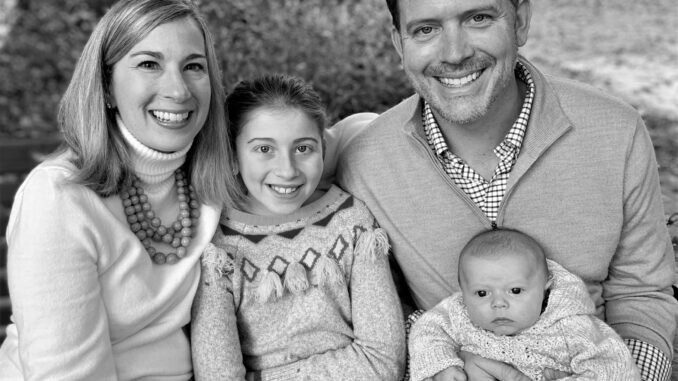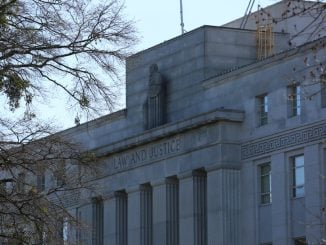
Our son’s birth mother had every reason in the world to terminate her pregnancy.
She is a former opioid abuser who had fought her way back into recovery, likely made more precarious by the stress of an unplanned pregnancy; she has four other children, three of whom had been placed with other family members, and one of whom she continues to care for despite his developmental delays and her struggle to pay monthly bills; she was in a violently abusive relationship with our son’s biological father, from whom she hid her entire pregnancy by wearing baggy clothes and checking herself into the hospital under an assumed name.
By nearly any measure, she had compelling and defensible reasons not to risk her own safety by nurturing and protecting the growing baby that would one day complete our family. But in the end, against so many odds, she carried this child to term knowing she would give him up to give him a chance. While I do not fully know her reasons for taking the difficult path through pregnancy, I am eternally grateful that she bravely chose adoption when she could have justifiably chosen abortion. He is now a thriving, happy, healthy blessing to all of us.
This is the outcome hoped for by an estimated 2 million U.S. couples each year who are waiting to adopt. And while this is not the case in all states, we were legally able to provide financial support to help her with expenses up to six weeks after the birth, in the hopes of getting her back on her feet and out of danger. She continues to face obstacles in her life, but the considerable financial and emotional burden of parenting another child is not one.
This notion of “burden,” and where it exists within a legal context, is what Supreme Court Justice Amy Coney Barrett sought to clarify last week during oral arguments in Dobbs v. Jackson’s Women’s Health, a case that will decide the viability of a Mississippi law seeking to ban most abortions after 15 weeks. If the court rules in favor of the existing Mississippi law, abortion legislation may be fully returned to the state level, overturning federal law decided in Roe v. Wade, which found that a woman’s right to an abortion was constitutionally protected.
Barrett said “[I]t doesn’t seem to me to follow that pregnancy and then parenthood are all part of the same burden, and so it seems to me that the choice, more focused, would be between say the ability to get an abortion at 23 weeks, or the state requiring the woman to go 15, 16 weeks more, and then terminate parental rights at the conclusion.”
Predictably, Justice Barrett has been excoriated for daring to suggest a woman might consider adoption as a viable, equal alternative to abortion, proving again that many have placed abortion upon an untouchable, near-sacred pedestal. Fellow Justice Sonia Sotomayor suggested that the very institution of the Supreme Court might not “survive the stench” of such an outcome. Dr. Leilah Zahedi, a Tennessee-based maternal fetal medicine specialist and fellow with Physicians for Reproductive Health said, “I’m unfortunately not surprised that adoption was brought up so much … It’s very infuriating to be honest.”
Democratic strategist Elizabeth Spiers wrote in the New York Times last week, “She [Barrett] may not realize it, but what she is suggesting is that women don’t need access to abortion because they can simply go do a thing that is infinitely more difficult, expensive, dangerous and potentially traumatic than terminating a pregnancy during its early stages,” later suggesting that the process of a pregnancy is a “kind of biological brainwashing” for creating a physical bond between mother and child.
However, perhaps if more expectant mothers were made aware of and encouraged to take advantage of myriad existing programs (grants for pre- and post-natal medical expenses, loss of employment/paid leave, existing child assistance, education scholarships, post-natal counseling, non-profit housing support for expectant and/or abused mothers, etc.), an unplanned pregnancy wouldn’t have to be as expensive, dangerous or traumatic. And if America directed at least as much funding toward expanding these programs as its current subsidy of Planned Parenthood (recently awarded $250 million to expand ‘family planning’ services), women might truly have more choices, and we could reset our course as a culture and a country, which currently keeps company with China and North Korea in allowing elective abortion after 20 weeks while millions of families long for a child to love.
People of good faith can and will continue to disagree, but such frantic entreaties from people of influence such as Justice Sotomayor, Ms. Spiers and Dr. Zahedi seem to indicate the loss of a sound logical position. Their unified presentation of abortion as the nobler, less traumatic choice for strong women who won’t be hoodwinked by biology is simply backwards. When so many are fighting so hard to not only support the right to abortion, but also to actively promote it over adoption, that is a bridge too far.
I have witnessed at least one woman’s tremendous courage in the face of this choice first-hand. And while I will never know exactly what led her to carry our son to term in her unbearable circumstance, we will always speak of her immense love for him, and pray he will come to understand, as we do, that there was something much larger than any of us — a beautiful mystery — that gave her pause. May we all be so brave.
Ms. Roberson is the Business and Features editor for the North State Journal.



